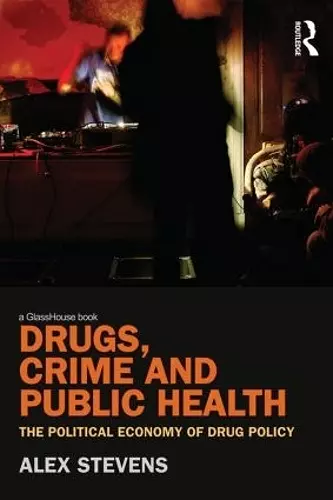Drugs, Crime and Public Health
The Political Economy of Drug Policy
Format:Hardback
Publisher:Taylor & Francis Ltd
Published:10th Sep '10
Currently unavailable, and unfortunately no date known when it will be back
This hardback is available in another edition too:
- Paperback£43.99(9780415610674)

Drugs, Crime and Public Health provides an accessible but critical discussion of recent policy on illicit drugs. Using a comparative approach - centred on the UK, but with insights and complementary data gathered from the USA and other countries - it discusses theoretical perspectives and provides new empirical evidence which challenges prevalent ways of thinking about illicit drugs. It argues that problematic drug use can only be understood in the social context in which it takes place, a context which it shares with other problems of crime and public health. The book demonstrates the social and spatial overlap of these problems, examining the focus of contemporary drug policy on crime reduction. This focus, Alex Stevens contends, has made it less, rather than more, likely that long-term solutions will be produced for drugs, crime and health inequalities. And he concludes, through examining competing visions for the future of drug policy, with an argument for social solutions to these social problems.
'penetrating and insightful... [Stevens] strikes exactly the right balance between accessibility and critical depth and has produced a book that will deservedly attract a wide readership.... I wish and hope that one or two presidents and prime ministers around the world end up reading a copy. Who knows what might happen then?' - Toby Seddon, British Journal of Criminology, Vol. 51 No. 4 (2011)
"Drugs, Crime and Public Health provides a powerful diagnosis of the drug problem and is a must-read for anybody seriously interested in the subject. The analysis is thoughtful and nuanced, yet refreshingly concise and clear-sighted. Rather than academic dissembling, the political implications are laid bare, though the call for 'more reliable evidence on which to build drug policy' is tinged with irony. Stevens' own analysis suggests the evidence he presents will be unplatable to those best placed to act on it and will almost certainly be subject to the processes of selectivity and silencing he describes. That said, the call for a progressive coalition has an air of realpolitik about it, encapsulating what might be taken as the book's core manifesto - drug policy is inevitably political, but is too important to be left to politicians and their advisors." - Michael Shiner, Druglink (September/October 2013)
'penetrating and insightful... [Stevens] strikes exactly the right balance between accessibility and critical depth and has produced a book that will deservedly attract a wide readership.... I wish and hope that one or two presidents and prime ministers around the world end up reading a copy. Who knows what might happen then?' - Toby Seddon, British Journal of Criminology, Vol. 51 No. 4 (2011)
'This is an interesting, relevant and wide-ranging book written with passion. The central question of this book is why the poor and socially deprived bear most of the harms related to the use of illegal drugs, when the use of such substances is found in all sectors of society? To explore this question, Alex Stevens situates drug policy within the political economy of the distribution of power and resources in society. By doing this, he distances himself from the more drug centered conceptions of drug policy that dominate both academic literature and policy making. This opens for interesting perspectives on the role and the relevance of drug policy in the distribution of drug related harm.' – Esben Houborg, Center for Alcohol and Drug Research, Aarhus University, Denmark
"Drugs, Crime and Public Health provides a powerful diagnosis of the drug problem and is a must-read for anybody seriously interested in the subject. The analysis is thoughtful and nuanced, yet refreshingly concise and clear-sighted. Rather than academic dissembling, the political implications are laid bare, though the call for 'more reliable evidence on which to build drug policy' is tinged with irony. Stevens' own analysis suggests the evidence he presents will be unplatable to those best placed to act on it and will almost certainly be subject to the processes of selectivity and silencing he describes. That said, the call for a progressive coalition has an air of realpolitik about it, encapsulating what might be taken as the book's core manifesto - drug policy is inevitably political, but is too important to be left to politicians and their advisors." - Michael Shiner, Druglink (September/October 2013)
ISBN: 9780415491044
Dimensions: unknown
Weight: 520g
202 pages